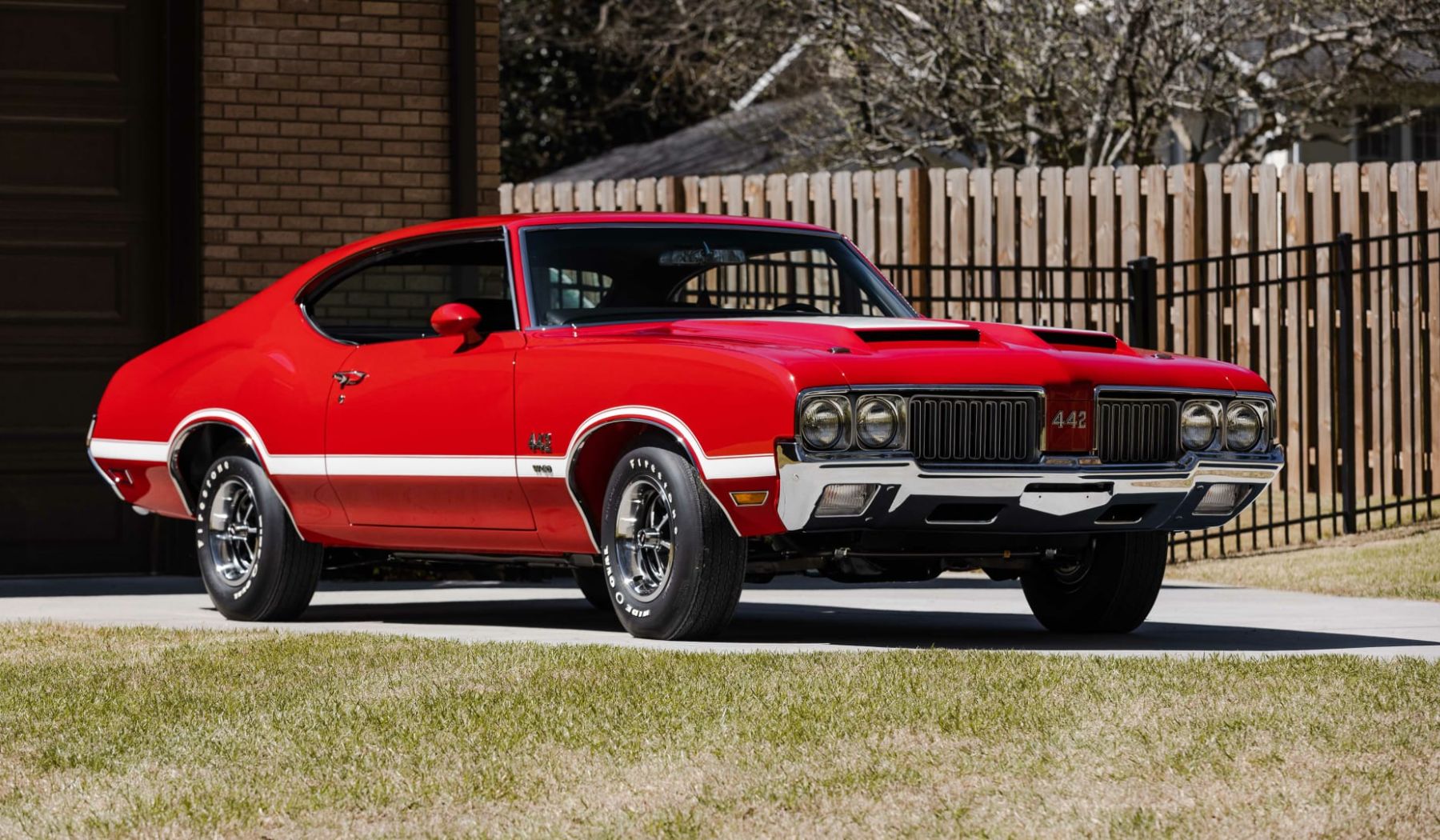
The automotive landscape is in a constant state of evolution, with traditional luxury stalwarts facing increasingly formidable challengers. In this dynamic arena, the 2025 Genesis Electrified GV70 emerges as a significant contender, aiming to carve out its niche in the premium electric SUV segment. But how does this ambitious newcomer truly stack up against the established might of German engineering, specifically the 2025 BMW X1, a benchmark in the luxury subcompact SUV category? This comprehensive MotorTrend analysis will put them head-to-head, dissecting every aspect to determine if the GV70 is indeed a true competitor to BMW’s storied lineup.
Our deep dive goes beyond mere specifications, aiming to provide an authoritative and expert voice on the capabilities and character of each vehicle. We will evaluate performance metrics, scrutinize design philosophies, assess technological prowess, and consider the subjective driving experience that ultimately defines these luxury SUVs. The goal is to furnish automotive enthusiasts and prospective buyers with a factual basis for understanding where each vehicle excels and where it might fall short.
Over the next several slides, we’ll systematically break down the critical areas that matter most to discerning drivers. From initial pricing and market perception to the intricacies of safety technology and interior refinement, we leave no stone unturned. Join us as we explore whether the Genesis GV70 possesses the blend of innovation, luxury, and performance required to genuinely challenge the long-held dominance of brands like BMW in the competitive luxury SUV segment.
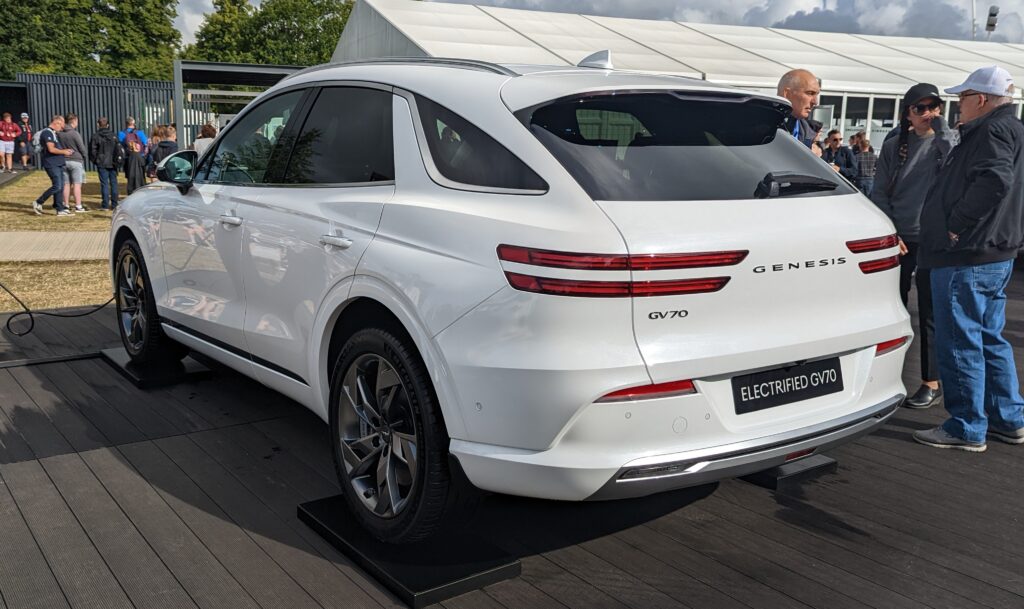
1. **Pricing and Market Position**
When evaluating any luxury vehicle, the initial sticker price and its perceived value within the market are crucial starting points. The 2025 Genesis Electrified GV70 enters the fray with an MSRP of $66,950, reflecting its premium electric powertrain and comprehensive standard features. While the average paid price for the GV70 stands at $66,554, indicating strong market acceptance close to its list price, it positions itself firmly in the higher echelons of the luxury SUV segment.
In stark contrast, the 2025 BMW X1, specifically the xDrive28i Sports Activity Vehicle, presents a much more accessible entry point with an MSRP of $41,350. The average paid price for the X1, at $39,054, further underscores its competitive pricing. This significant price differential immediately signals that while both are luxury SUVs, they target somewhat different customer segments, with the GV70 commanding a substantially higher premium.
Delving into their U.S. News Scores offers further insight into their market standing. The Genesis GV70 achieves an Overall score of 8.8 out of 10, bolstered by an impressive Critics’ Rating of 9.1 out of 10. This indicates a strong critical reception, praising its design, performance, and overall package. Such a high critics’ score suggests that automotive experts recognize the GV70’s inherent quality and appeal, perhaps viewing it as a fresh, exciting alternative.
The BMW X1, meanwhile, secures a slightly higher Overall U.S. News Score of 9.3 out of 10, demonstrating its well-rounded competence and broad appeal. However, its Critics’ Rating is 8.5 out of 10, which, while respectable, falls short of the GV70’s critical acclaim. This discrepancy suggests that while the X1 is a highly capable and popular choice, the GV70 might offer a more distinctive or compelling proposition for those seeking the very latest in luxury and technology, particularly from an expert perspective.
Read more about: Beyond Subcompact: An Expert’s Guide to the Redesigned 2025 Mini Countryman Compact Crossover

2. **Performance Dynamics**The heart of any MotorTrend review lies in the performance, and here, the 2025 Genesis Electrified GV70 and the 2025 BMW X1 diverge significantly, reflecting their distinct powertrain philosophies. The GV70, as an electric vehicle, delivers robust performance with an impressive 429 horsepower and a staggering 516 lb-ft of torque. This instantly available electric power translates into rapid acceleration and a thrilling driving experience, as indicated by its Performance score of 8.2 out of 10.
The heart of any MotorTrend review lies in the performance, and here, the 2025 Genesis Electrified GV70 and the 2025 BMW X1 diverge significantly, reflecting their distinct powertrain philosophies. The GV70, as an electric vehicle, delivers robust performance with an impressive 429 horsepower and a staggering 516 lb-ft of torque. This instantly available electric power translates into rapid acceleration and a thrilling driving experience, as indicated by its Performance score of 8.2 out of 10.
In contrast, the BMW X1 xDrive28i is powered by an Intercooled Turbo Premium Unleaded I-4 2.0 L/122 engine, generating 241 horsepower at 4500 RPM and 295 lb-ft of torque at 1500 RPM. While these figures are competitive for its class, the X1’s Performance score of 8.1 out of 10, though nearly identical to the GV70’s, belies the raw power differential. The X1’s engine provides good power and great handling, particularly for a gasoline-powered compact SUV, offering a traditional, engaging driving feel that enthusiasts often appreciate.
Both vehicles feature All Wheel Drive drivetrains and Automatic transmissions, ensuring confident traction and smooth power delivery across various conditions. However, the nature of their power sources means the driving sensations are inherently different. The GV70 offers the silent, linear, and immediate thrust characteristic of an EV, which can be exhilarating and surprisingly potent. This electric advantage gives it a significant edge in sheer acceleration and low-end torque compared to its gasoline counterpart.
The X1’s turbocharged gasoline engine, on the other hand, provides a more familiar auditory and tactile feedback, with power building through the rev range. While the M35i Sports Activity Vehicle variant is mentioned in the context as having turbo lag, this specific characteristic is not attributed to the xDrive28i in the general pros and cons, which is the primary comparative model here. The X1 delivers a balanced blend of efficiency and responsiveness for a conventional powertrain, but it simply cannot match the instant, overwhelming torque of the GV70’s electric motors, which are designed for immediate response.
Read more about: Is the 2025 Toyota Corolla Hybrid the Ultimate Urban Companion? An In-Depth Car and Driver Analysis
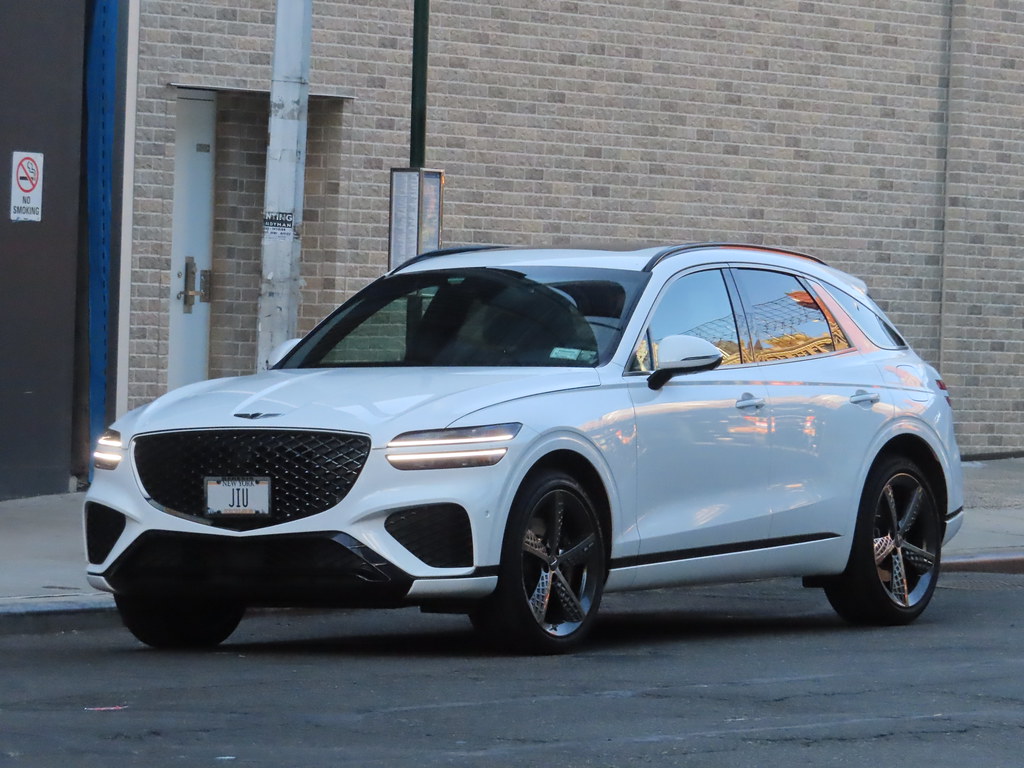
3. **Exterior Design & Dimensions**
The visual appeal and physical footprint of an SUV significantly influence its road presence and practicality. The 2025 Genesis Electrified GV70 boasts “Posh looks inside and out” according to its pros, presenting a sophisticated and distinctive design language that sets it apart. Its overall dimensions – a length of 185.6 inches, width of 75.2 inches (without mirrors), and a substantial wheelbase of 113.2 inches – contribute to a commanding and upscale stance. The GV70 is explicitly categorized as a Sport Utility vehicle, a common descriptor for its segment.
The 2025 BMW X1, while undeniably stylish, adopts a slightly more compact and agile profile, fitting its designation as a Luxury Subcompact SUV and a Sports Activity Vehicle. Its length measures 177.2 inches, width without mirrors is 72.6 inches, and its wheelbase extends to 106 inches. Interestingly, the X1 is marginally taller than the GV70, with an overall height of 64.6 inches compared to the GV70’s 64.2 inches. Despite this, the GV70’s longer and wider body gives it a more substantial road presence.
These dimensional differences translate into practical implications. The GV70’s longer wheelbase and greater width inherently suggest more interior space and a potentially more stable ride, characteristics often associated with larger luxury SUVs. Its exterior design elements, such as the standard panoramic roof, rear spoiler, and sun/moon roof, contribute to its sleek, modern aesthetic and sense of openness. The X1 also offers a panoramic roof, rear spoiler, and sun/moon roof, though these are listed as optional in some cases, highlighting differences in standard equipment levels.
Ultimately, while both vehicles exude a premium aura, their exterior designs cater to slightly different preferences. The GV70 leans into a more opulent and substantial aesthetic, leveraging its larger footprint to project an image of effortless luxury. The X1, with its sportier proportions, emphasizes agility and a more compact, dynamic feel. Both demonstrate thoughtful design, but the Genesis makes a bolder statement with its “posh looks,” aiming to differentiate itself visually in a crowded market.
Read more about: Is the 2025 Toyota Corolla Hybrid the Ultimate Urban Companion? An In-Depth Car and Driver Analysis

4. **Interior Quality & Comfort**
Stepping inside, the interior quality and comfort features are paramount for any luxury SUV, and here the 2025 Genesis Electrified GV70 and 2025 BMW X1 present a nuanced comparison. The BMW X1 shines brightly in this regard, earning an impressive Interior score of 9.0 out of 10. Its “high-quality interior materials and workmanship” are highlighted as a significant pro, underscoring BMW’s long-standing reputation for crafting cabins that blend premium aesthetics with tactile satisfaction. This meticulous attention to detail often sets a benchmark for the segment.
The Genesis GV70, while offering a generally “Posh looks inside and out” experience, registers an Interior score of 7.7 out of 10. Despite this lower numerical rating, the GV70 distinguishes itself with a suite of comfort features that are often found on much more expensive vehicles, or are optional for competitors. For instance, it comes standard with a Seat-Massage function and a Cooled Driver Seat, offering an elevated level of in-cabin luxury and well-being that is quite exceptional for its segment and price point.
Both vehicles offer Heated Front Seats as standard, a welcome feature for comfort in colder climates. However, the GV70 extends its luxury offerings with an optional Heated Rear Seat, further enhancing passenger comfort. While the X1 provides Driver Lumbar and Passenger Lumbar support as optional features, the GV70 includes them as standard with its power-adjustable seating, showcasing its commitment to comprehensive comfort from the base model up. Leather Seats are optional for the GV70, while the X1 offers Premium Synthetic Seats as an option.
Considering the objective scores versus the subjective features, the X1’s higher Interior score likely reflects its overall consistency in material quality and assembly, a hallmark of BMW. However, the GV70 counters with an impressive array of advanced comfort features offered as standard, such as seat massage and cooling, which genuinely elevate the occupant experience. This creates a compelling argument for the GV70, especially for buyers prioritizing cutting-edge comfort technologies and a truly pampering environment, despite the numerical disparity in overall interior scoring. The Genesis brand is clearly aiming to provide an abundance of luxury amenities.
Read more about: Is the 2025 Toyota Corolla Hybrid the Ultimate Urban Companion? An In-Depth Car and Driver Analysis
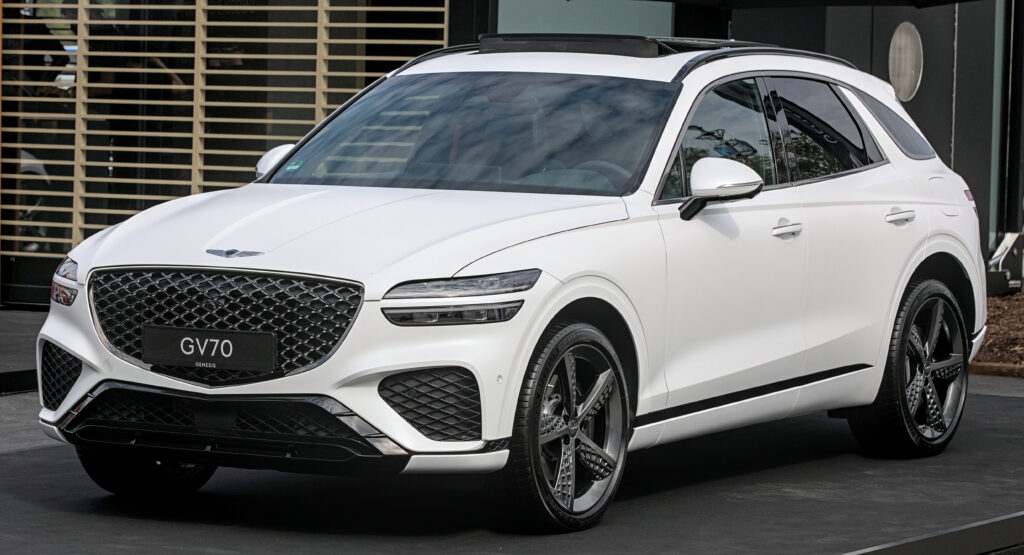
5. **Infotainment & Connectivity**
In today’s digitally driven world, a vehicle’s infotainment and connectivity suite is as crucial as its engine performance. The 2025 Genesis Electrified GV70 makes a strong statement with its extensive list of standard technological features. It includes AM/FM Stereo, Android Auto, Apple CarPlay, Auxiliary Audio Input, HD Radio, MP3 Player, Satellite Radio, and Smart Device Integration as standard. Furthermore, it offers a standard WiFi Hotspot, Navigation System, Onboard Hands-Free Communications System, and Wireless Cell Phone Hookup, ensuring drivers and passengers are always connected and entertained. A Premium Sound System is available as an option for those seeking an even richer audio experience.
The 2025 BMW X1 also provides essential connectivity, featuring standard Android Auto and Apple CarPlay, which are vital for smartphone integration. However, the X1’s “Complex infotainment system” is listed as a con, suggesting that while the functionality is present, its user interface might be less intuitive or more cumbersome to operate compared to rivals. This can be a significant drawback in daily use, where ease of interaction is highly valued. The X1 offers an Optional Navigation System and Premium Sound System, requiring additional investment to match some of the GV70’s standard offerings.
The Genesis GV70’s comprehensive standard package for infotainment truly stands out. The inclusion of a WiFi Hotspot, a full Navigation System, and Wireless Cell Phone Hookup from the base model up demonstrates a clear advantage in value proposition. This means owners don’t have to delve into optional extras to get a fully connected and informed driving experience, streamlining the purchasing process and enhancing immediate usability.
While both vehicles ensure seamless smartphone integration through Apple CarPlay and Android Auto, the GV70’s broader array of *standard* integrated features presents a more complete and less fragmented digital ecosystem. The X1’s potentially complex interface, as noted in its cons, could deter users who prioritize simplicity and immediate usability. For those who value a rich, intuitive, and readily available suite of digital amenities, the GV70 positions itself as a strong contender, offering a thoroughly modern and connected cabin right out of the box.
Read more about: Is the 2025 Toyota Corolla Hybrid the Ultimate Urban Companion? An In-Depth Car and Driver Analysis
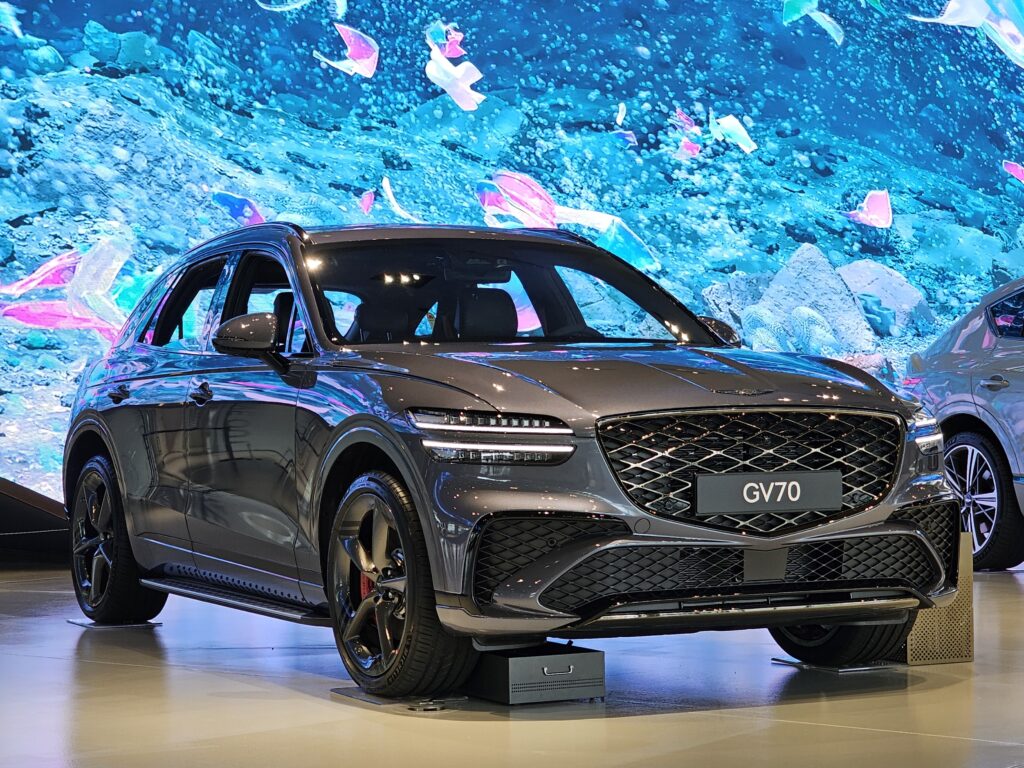
6. **Cargo and Passenger Space**
Practicality and spaciousness are key considerations for SUV buyers, impacting everything from daily commutes to family road trips. The 2025 Genesis Electrified GV70, being a slightly larger vehicle in overall dimensions, offers a substantial passenger volume of 102.8 cubic feet. In terms of cargo, it provides 56.5 cubic feet when the second row is folded down (Cargo Volume to Seat 1), and 28.7 cubic feet behind the second row (Cargo Volume to Seat 2/Seat 3). Passenger comfort is addressed with 38.6 inches of front headroom, 41.3 inches of front legroom, and 59.1 inches of front shoulder room. Rear passengers benefit from 38.3 inches of headroom, 36.6 inches of legroom, and 56.9 inches of shoulder room. It comfortably accommodates 5 passengers.
The 2025 BMW X1, while being more compact, impressively maximizes its interior space. It offers a slightly greater maximum cargo volume of 57.2 cubic feet (Cargo Volume to Seat 1) when the rear seats are stowed, though its cargo space behind the second row is 25.7 cubic feet (Cargo Volume to Seat 2/Seat 3), slightly less than the GV70. For passengers, the X1 boasts a generous 42.1 inches of front headroom, providing ample clearance for taller occupants, along with 40.4 inches of front legroom and 56.1 inches of front shoulder room. In the second row, there are 39.3 inches of headroom, 37 inches of legroom, and 55.1 inches of shoulder room. It also seats 5 passengers.
Analyzing these figures reveals a thoughtful approach to interior packaging from both manufacturers. The X1 edges out the GV70 in maximum cargo capacity when the seats are folded, suggesting its design is highly efficient for hauling larger items. It also provides superior front headroom, which is a notable advantage for taller drivers and front passengers. However, the GV70 offers more front legroom and shoulder room, creating a feeling of greater spaciousness in the primary seating positions.
In the second row, the X1 again offers slightly more headroom, while the GV70 provides a noticeable advantage in both second-row legroom and shoulder room. This suggests that while the X1 might feel airier upfront for taller individuals, the GV70 could offer a more comfortable experience for rear-seat passengers, particularly on longer journeys, due to its increased leg and shoulder space. The GV70’s higher passenger volume further reinforces its generally more accommodating cabin, offering a nuanced advantage in overall comfort for all occupants.
Read more about: Is the 2025 Toyota Corolla Hybrid the Ultimate Urban Companion? An In-Depth Car and Driver Analysis
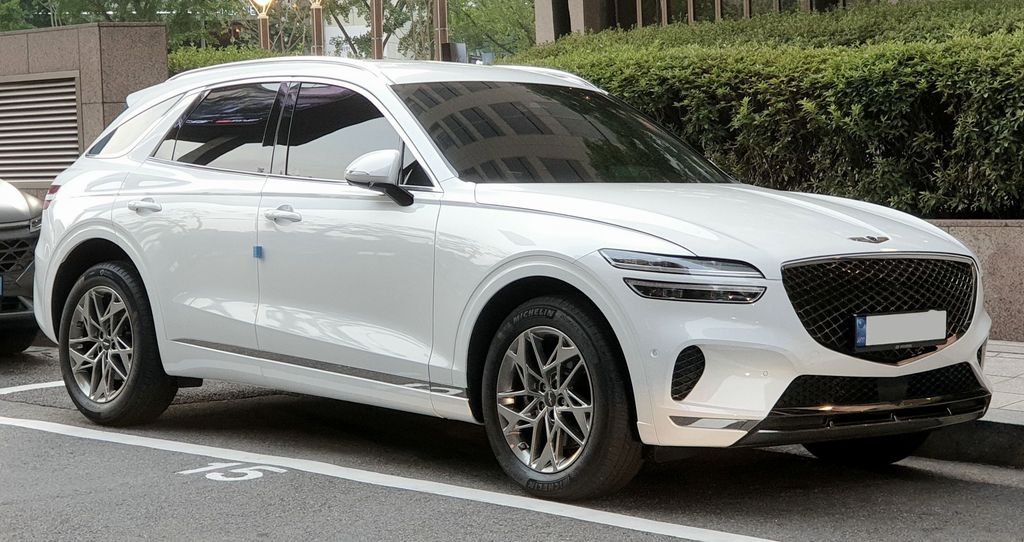
7. **Advanced Driver-Assistance Systems (ADAS) & Active Safety**
Modern luxury SUVs are expected to offer a comprehensive suite of advanced driver-assistance systems (ADAS) to enhance safety and reduce driver fatigue. Both the 2025 Genesis Electrified GV70 and the BMW X1 are equipped with a strong foundation of active safety technologies. These include standard features such as Blind Spot Monitor, Lane Departure Warning, Lane Keeping Assist, Brake Assist, Electronic Stability Control, Traction Control, and Rear Parking Aid. These systems work in concert to help drivers maintain control, avoid collisions, and navigate challenging traffic situations with greater confidence.
However, the Genesis GV70 distinguishes itself with several key enhancements that push its active safety capabilities further. It comes standard with Automatic Parking, a highly convenient feature that assists with parallel and perpendicular parking maneuvers, reducing stress in urban environments. The BMW X1 offers Automatic Parking as an option, indicating an additional cost to access this convenience. This difference in standard vs. optional availability highlights Genesis’s commitment to delivering a rich safety and convenience package without requiring extensive upgrades.
Perhaps the most significant differentiator in active safety is found in the area of cross-traffic alert systems. Both vehicles feature a Rear Cross-Traffic Warning system, which alerts drivers to vehicles approaching from the side when backing up. However, the GV70 takes this a step further with Rear Cross-Traffic Collision-Avoidance Assist, which not only warns the driver but also “automatically applies the brakes” to help prevent a collision. The context explicitly notes that the BMW X3’s Cross Traffic Warning (and by extension, likely the X1’s standard system) does not automatically brake, giving the GV70 a tangible advantage in preventing low-speed parking lot incidents.
Furthermore, the GV70 includes a standard Driver Alert Monitor, a system designed to detect an inattentive driver, sound a warning, and suggest a break. This proactive safety feature can significantly mitigate the risks associated with fatigued or distracted driving, which contribute to a substantial number of accidents annually. The BMW X3 does not offer a driver alert monitor, highlighting another area where Genesis prioritizes advanced preventative safety. This combination of intelligent braking for cross-traffic and driver attention monitoring positions the GV70 as a leader in comprehensive active safety, aiming to prevent accidents before they occur.
Read more about: Is the 2025 Buick Enclave Worth the Hype? An In-Depth Car and Driver Review of Buick’s Flagship SUV
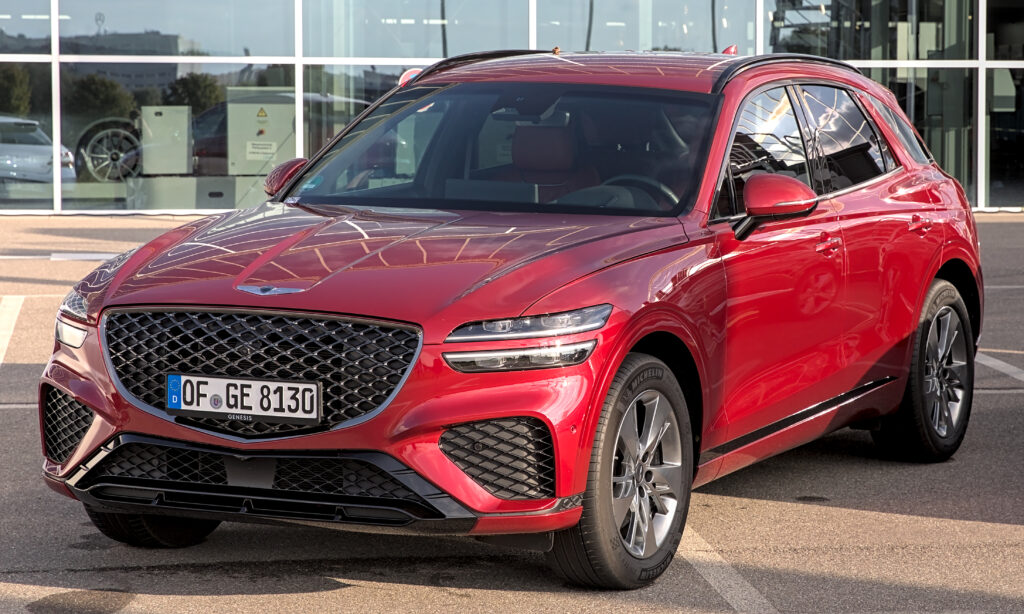
8. **Passive Safety Features and Structural Integrity**
While active safety systems play a pivotal role in preventing collisions, the underlying passive safety features and structural integrity are paramount for occupant protection when an accident becomes unavoidable. Both the 2025 Genesis Electrified GV70 and the 2025 BMW X1 come equipped with a solid foundation of passive safety, including standard driver and passenger frontal airbags, front side-impact airbags, driver knee airbags, a front seat center airbag, side-impact head airbags, and front seatbelt pretensioners. However, the Genesis GV70 distinguishes itself with several advanced features designed to further enhance protection and adaptability.
Delving into the specifics, the GV70 incorporates pre-crash front seatbelts that automatically tighten when the vehicle detects an impending collision. This proactive measure significantly improves occupant protection by ensuring a better fit against the seat and reducing potential injury. Furthermore, the GV70 offers height-adjustable front seat shoulder belts, a crucial detail that accommodates a wider range of driver and passenger heights, enhancing both comfort and the effectiveness of the restraint system. In contrast, the BMW X3, which shares many characteristics with the X1 in the provided context, does not offer these pre-crash pretensioners or height-adjustable seat belts, marking a clear differentiator in advanced passive restraint technology.
Child safety is another area where Genesis prioritizes innovation. Both vehicles include child safety locks to prevent rear doors from opening unexpectedly. However, the GV70 features power child safety locks, allowing the driver to conveniently activate and deactivate them from the driver’s seat and receive confirmation of their engagement. This intelligent design contrasts with the X3’s manual child locks, which require individual engagement at each rear door, without providing the driver with immediate status feedback. Moreover, the GV70 addresses a critical safety concern with its back seat reminder system, which prompts drivers to check the rear seat upon turning off the vehicle if a rear door was opened prior to the journey. The X3, notably, lacks this vital feature, which can help prevent tragic accidents involving children or pets left inadvertently in the vehicle.
Beyond basic restraints, the GV70’s intelligent airbag system deploys smart airbags with varying levels of force or can even suppress deployment based on vehicle speed sensors and seat sensors, better protecting occupants of different sizes in diverse collision scenarios. Its side airbags, for instance, are designed to shut off if a child is leaning against the door, preventing unnecessary full-force deployment. This level of sophistication is not present in the X3’s side airbags, which will always deploy at full force regardless of occupant position. Crucially, the Genesis GV70 (built after April 2024) has earned the Insurance Institute for Highway Safety’s (IIHS) highest rating of “Top Safety Pick Plus” for the 2025 model year, with “Good” ratings in stringent crash tests and an “Acceptable” score in pedestrian crash prevention. This prestigious accolade definitively underscores the GV70’s superior structural integrity and occupant protection, especially given that the X3 has not yet been evaluated by the IIHS for 2025.
Read more about: Navigating the Road Ahead: A Deep Dive into the Most Common 2025 Tesla Model 3 Service Issues and Recalls
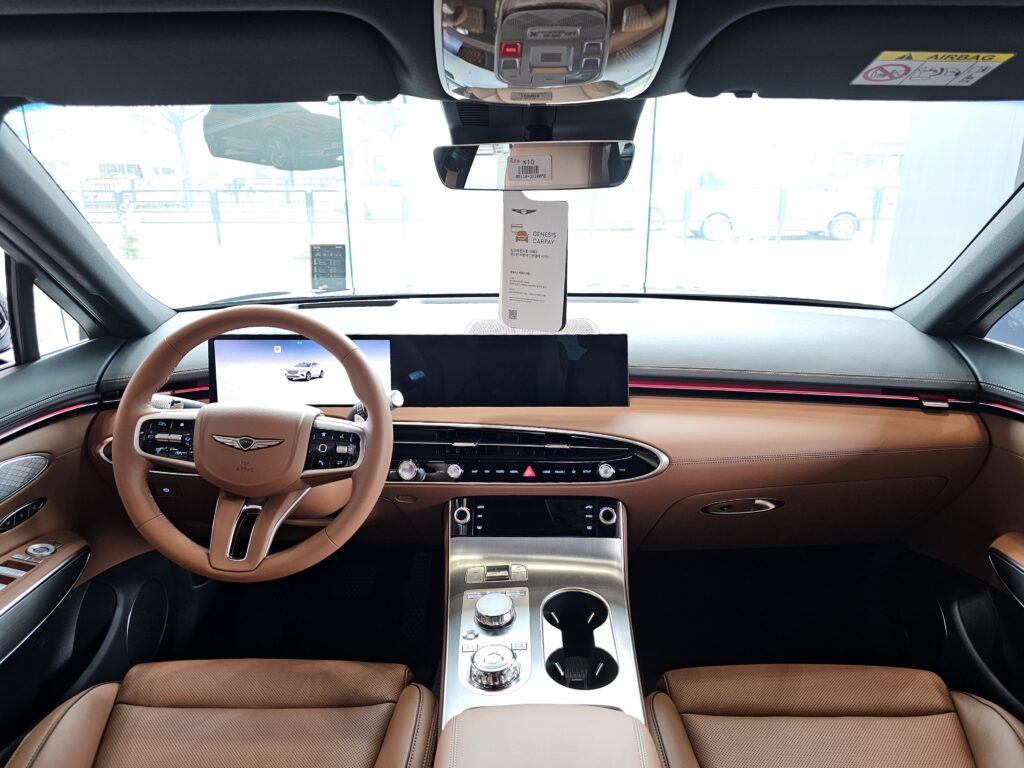
9. **Everyday Convenience**
Beyond raw performance and safety, the true measure of a luxury SUV often lies in the thoughtful conveniences that streamline daily life and enhance the ownership experience. Both the GV70 and X1 offer a baseline of expected amenities such as power windows, rear defrost, adjustable steering wheels, and keyless entry/start. However, the 2025 Genesis Electrified GV70 elevates the standard convenience package considerably, often including features that are optional or unavailable on its BMW counterpart.
Genesis’s commitment to an effortless user experience is evident in its array of standard power-operated features. The GV70 comes standard with a hands-free liftgate and a power liftgate, simplifying access to the cargo area, especially when approaching the vehicle with arms full. Remote engine start is also standard on the GV70, allowing drivers to warm up or cool down the cabin before entry—a highly valued convenience in varying climates. These features, which are either optional or not explicitly listed as standard on the BMW X1, demonstrate Genesis’s philosophy of delivering a richly equipped vehicle right off the showroom floor.
Further enhancing daily driving ease, the GV70 includes standard mirror memory, allowing multiple drivers to save their preferred mirror positions, and power folding mirrors, a boon for navigating tight parking spaces or automatic car washes. An electrochromic rearview mirror, standard on the GV70, automatically dims to reduce glare from following vehicles, contributing to safer night driving. These seemingly minor details collectively add up to a significantly more refined and user-friendly experience, underscoring the GV70’s dedication to integrated luxury.
While the BMW X1 does offer standard features like power mirrors, cruise control, and rain-sensing wipers, its approach often places several desirable conveniences as optional extras. For instance, features like automatic parking (which, as previously noted, the GV70 offers standard), heated steering wheel, or a heads-up display are choices for X1 buyers, potentially driving up the overall cost. This difference in packaging highlights Genesis’s assertive strategy to provide a more comprehensive standard feature set, making the GV70 a compelling value proposition for those seeking a wealth of convenience without extensive customization.
Read more about: Unlock Affordable Wellness: Your Comprehensive Guide to Healthy Home Cooking Without Draining Your Wallet
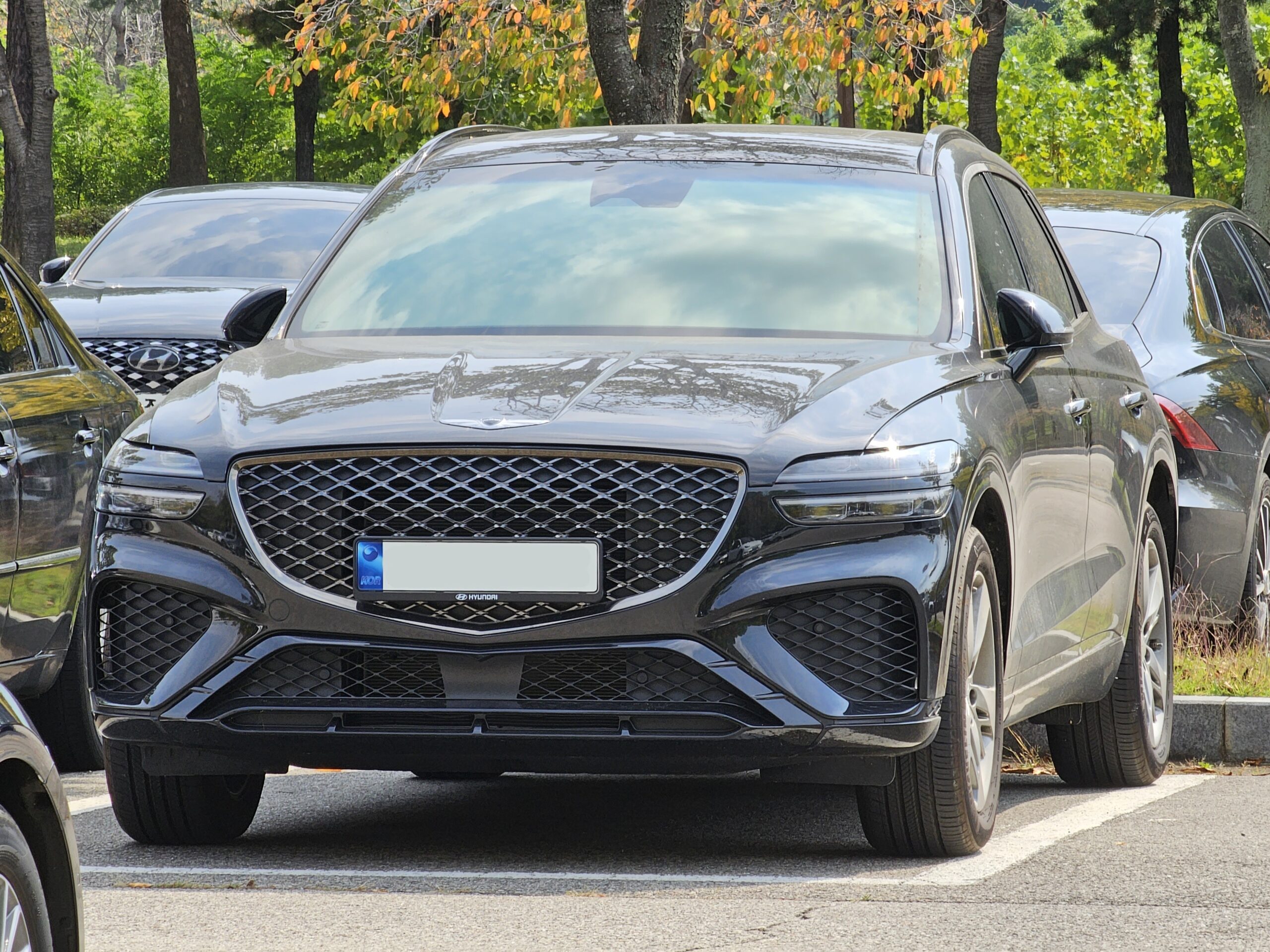
10. **Crucial Fuel Economy and Range Considerations**
When comparing an electric vehicle like the 2025 Genesis Electrified GV70 against a traditional gasoline-powered SUV such as the 2025 BMW X1, the discussion around “fuel economy” naturally bifurcates into distinct considerations: electric range and gasoline efficiency. This fundamental powertrain difference dictates not only operating costs but also the entire refueling experience and suitability for various driving habits.
For the Electrified GV70, its identity as a pure electric vehicle means drivers must consider its range and charging infrastructure. The GV70 offers an estimated driving range of 236 miles on a full charge. While this figure is competitive within the electric SUV segment, it is also listed as a “modest driving range” among its cons, implying it might necessitate more frequent charging stops for drivers embarking on longer journeys. However, a significant pro is its “fast charging times,” which helps mitigate range concerns by allowing for quicker replenishment of its electric fuel system at compatible charging stations.
In stark contrast, the BMW X1 xDrive28i relies on a conventional Intercooled Turbo Premium Unleaded I-4 2.0 L/122 engine. While specific MPG figures for the 2025 model year’s primary comparative trim are not provided, its pros highlight “Exceptional fuel economy for its class.” This indicates a strong performance in efficiency for a gasoline-powered luxury compact SUV. The X1’s 14.3-gallon fuel tank capacity, paired with readily available gasoline stations, offers the traditional convenience of quick and widespread refueling, eliminating the need to plan around charging times or charger availability.
Ultimately, the choice between these two vehicles comes down to a lifestyle decision. The GV70 offers silent, emission-free driving with potentially lower per-mile energy costs, but requires adapting to charging routines and managing a finite range. The X1, on the other hand, provides the familiarity and flexibility of gasoline power, with its impressive fuel economy minimizing trips to the pump while offering instant, ubiquitous refueling. Enthusiasts weighing environmental impact against traditional driving convenience will find a clear distinction here, with the GV70 representing the cutting edge of automotive propulsion.
Read more about: Is the 2025 Toyota Corolla Hybrid the Ultimate Urban Companion? An In-Depth Car and Driver Analysis
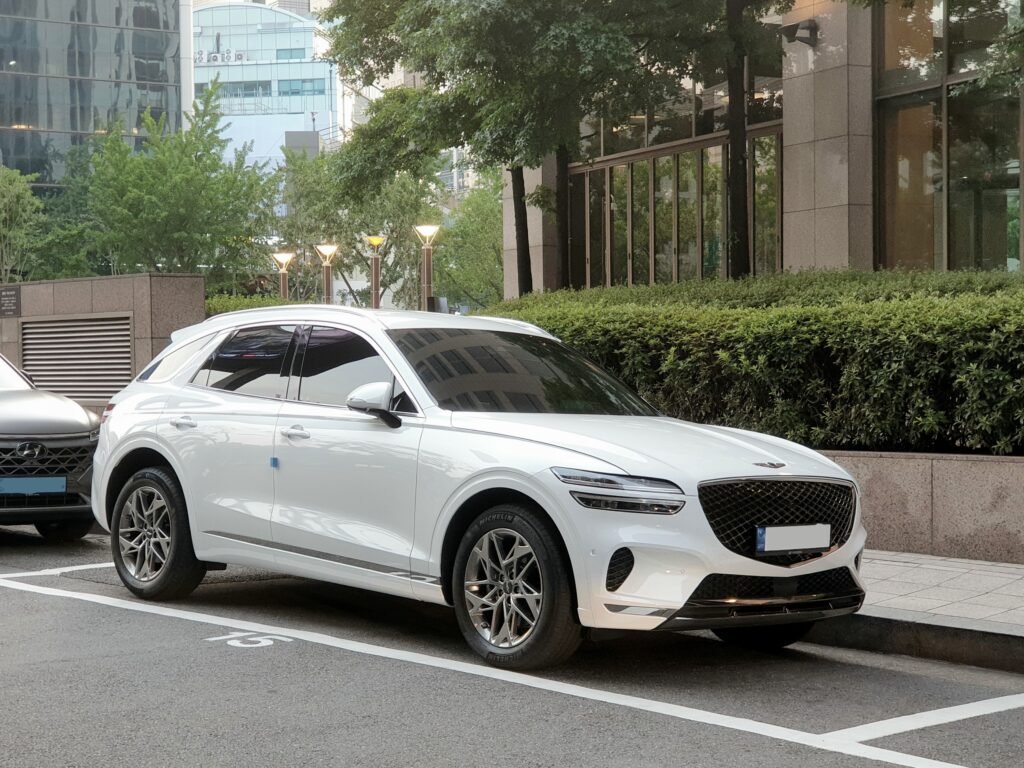
11. **Vehicle Weight and Towing Capabilities**
The physical mass of a vehicle plays a critical role in its performance, handling dynamics, and perceived solidity, especially in the luxury SUV segment where a substantial feel is often equated with quality. Furthermore, towing capabilities extend a vehicle’s utility, catering to lifestyles that require hauling trailers for leisure or work. Here, the 2025 Genesis Electrified GV70 and the 2025 BMW X1 present noticeably different profiles.
The 2025 Genesis Electrified GV70 tips the scales with a base curb weight of 4982 pounds. This substantial weight is largely attributable to its robust electric powertrain, including the heavy battery pack and electric motors, which are integral to its impressive performance. This heft can contribute to a sense of planted stability on the road, often desirable in a luxury SUV, but it also has implications for overall energy consumption and dynamic responsiveness, despite the immediate torque delivery of its electric motors.
Conversely, the 2025 BMW X1, specifically the xDrive28i, is considerably lighter, with a base curb weight of 3750 pounds. This lighter construction contributes to its agile and sporty driving characteristics, aligning with BMW’s reputation for engaging driving dynamics. The lower weight can also play a role in its “Exceptional fuel economy for its class,” as less mass requires less energy to move. This nearly 1200-pound difference underscores the distinct engineering priorities of an electric luxury SUV versus its gasoline counterpart.
Regarding utility, the Genesis GV70 demonstrates commendable capability with a maximum trailering capacity of 3500 pounds. This significant towing capacity, coupled with the availability of an optional trailer hitch receiver, makes the GV70 a versatile option for owners who occasionally need to tow small boats, utility trailers, or recreational vehicles. It extends the vehicle’s practicality beyond mere passenger and cargo transport, adding another layer of functionality to its luxury appeal.
For the BMW X1, the provided context does not list a maximum trailering capacity. This omission suggests that towing is either not a primary design consideration for the X1 in its xDrive28i configuration, or that its capabilities are more limited compared to the GV70. For buyers prioritizing utility and the ability to tow, the Genesis GV70 presents a clear, tangible advantage, offering a level of versatility not explicitly detailed for its BMW competitor.
Read more about: Is the 2025 Toyota Corolla Hybrid the Ultimate Urban Companion? An In-Depth Car and Driver Analysis
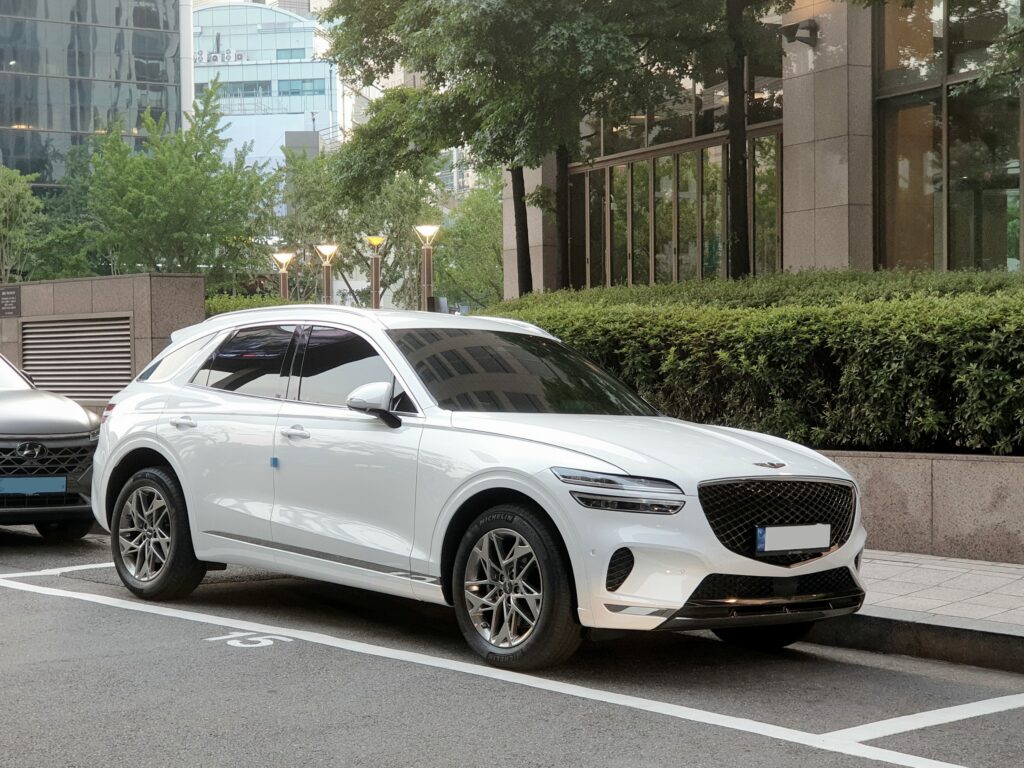
12. **Nuanced Ride and Handling Characteristics**
The driving experience is arguably the most defining characteristic of any premium vehicle, and in the luxury SUV segment, a nuanced balance of ride comfort and dynamic handling is paramount. Both the 2025 Genesis Electrified GV70 and the 2025 BMW X1 are engineered with sophisticated suspension systems, utilizing a Strut-type front suspension and a Multi-Link rear suspension, which are common and effective designs for achieving a balance of control and comfort.
However, the Genesis GV70 takes a significant step forward in ride refinement by offering a standard Active Suspension System. This advanced technology allows the vehicle to continuously adapt its damping forces in real-time, responding to road conditions and driving inputs. The result is an exceptionally composed and comfortable ride, capable of smoothing out imperfections while providing firm control during dynamic maneuvers. This standard inclusion underscores Genesis’s commitment to delivering a truly plush and adaptable driving experience without requiring an additional option package, a noteworthy differentiator from many competitors.
The BMW X1, while sharing the same fundamental suspension architecture, offers an Active Suspension System as an optional feature. This means that to achieve a comparable level of ride sophistication, buyers would need to invest further, potentially altering the X1’s initial value proposition. The X1 is widely praised for its “Good power and great handling,” suggesting an inherent sportiness and agility that drivers accustomed to BMW’s driving ethos will appreciate. Its slightly larger turning diameter of 38.4 inches, compared to the GV70’s 37.8 inches, subtly indicates a minor difference in maneuverability, particularly in tight urban settings.
Ultimately, while both vehicles deliver competent and engaging driving experiences for their respective segments, their approaches to ride and handling diverge. The GV70, with its standard active suspension and the immediate, linear power delivery of its electric motors, offers a sophisticated, smooth, and supremely composed ride, often feeling more substantial and refined. The X1, especially without the optional active suspension, leans into a more traditional, agile, and communicative character, appealing to those who prioritize a direct, sporty feel characteristic of the BMW brand. The GV70 subtly redefines the expectation of standard luxury dynamics.
Read more about: Is the 2025 Toyota Corolla Hybrid the Ultimate Urban Companion? An In-Depth Car and Driver Analysis
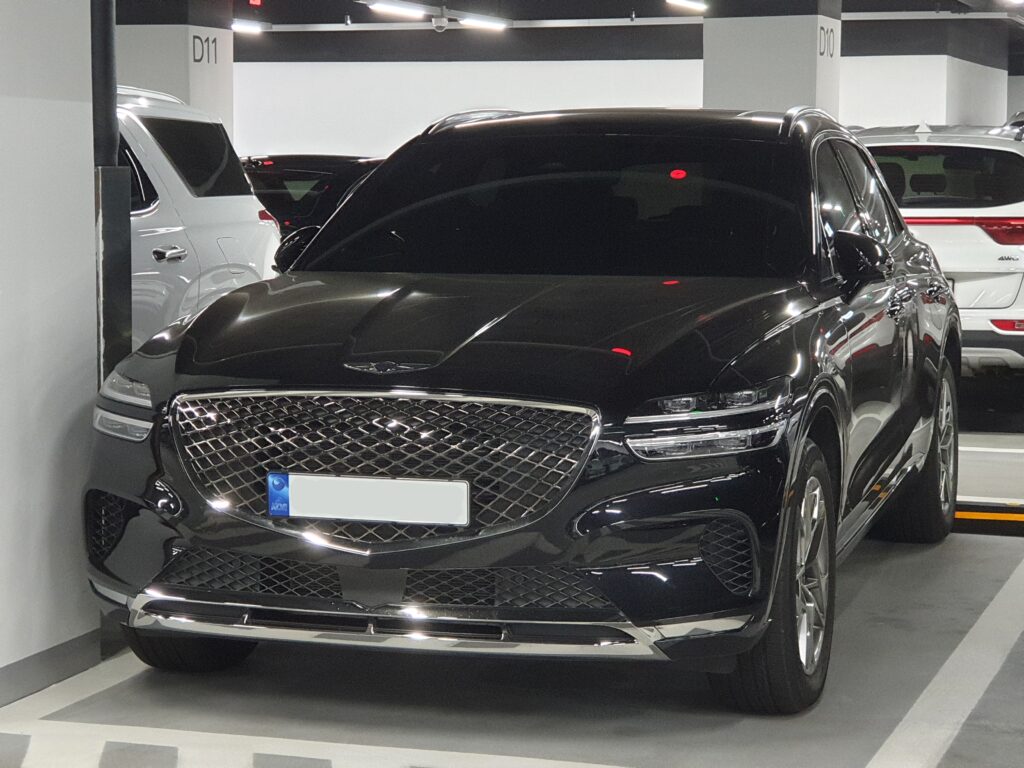
13. **Comprehensive Standard Equipment Offerings**
A hallmark of true luxury and a key differentiator in today’s competitive automotive market is the breadth and depth of standard equipment. The 2025 Genesis Electrified GV70 makes a resounding statement with its philosophy of offering “Lots of standard equipment,” challenging the traditional luxury model of extensive, costly option lists. This approach significantly enhances the GV70’s value proposition and immediately positions it as a highly compelling contender.
From the moment you approach the vehicle, the GV70’s commitment to standard luxury is evident. A panoramic roof, typically an upgrade on many vehicles, comes standard, bathing the cabin in natural light and enhancing the sense of spaciousness. Inside, the GV70 pampers its occupants with a standard seat-massage function and a cooled driver seat—luxuries often reserved for the highest trims or expensive packages in other premium SUVs. Features like power-adjustable driver and passenger seats, complete with standard passenger lumbar support, further reinforce the GV70’s dedication to comprehensive comfort from the base model.
The technological and convenience arsenal included as standard is equally impressive. The GV70 comes fully equipped with a robust infotainment suite featuring a navigation system, a WiFi hotspot, an onboard hands-free communications system, and wireless cell phone hookup. Complementing this, convenient features such as a hands-free power liftgate, remote engine start, power folding mirrors, mirror memory, and a universal garage door opener are all standard, streamlining daily interactions and elevating the user experience without additional investment.
This generous list of standard features stands in stark contrast to the approach often taken by the BMW X1, where many comparable amenities might be optional extras. While the X1 is undoubtedly a premium vehicle, its configuration often requires buyers to delve into an options catalog to achieve a similar level of equipment. This difference not only underscores Genesis’s aggressive strategy to deliver exceptional value but also positions the GV70 as a vehicle that offers a more complete and immediately satisfying luxury experience, ensuring owners don’t feel short-changed on features right out of the box.
Read more about: The Ultimate 2025 Guide: Top 10 Fuel-Efficient Road Trip Vehicles Balancing Performance, Space, and Unrivaled Comfort
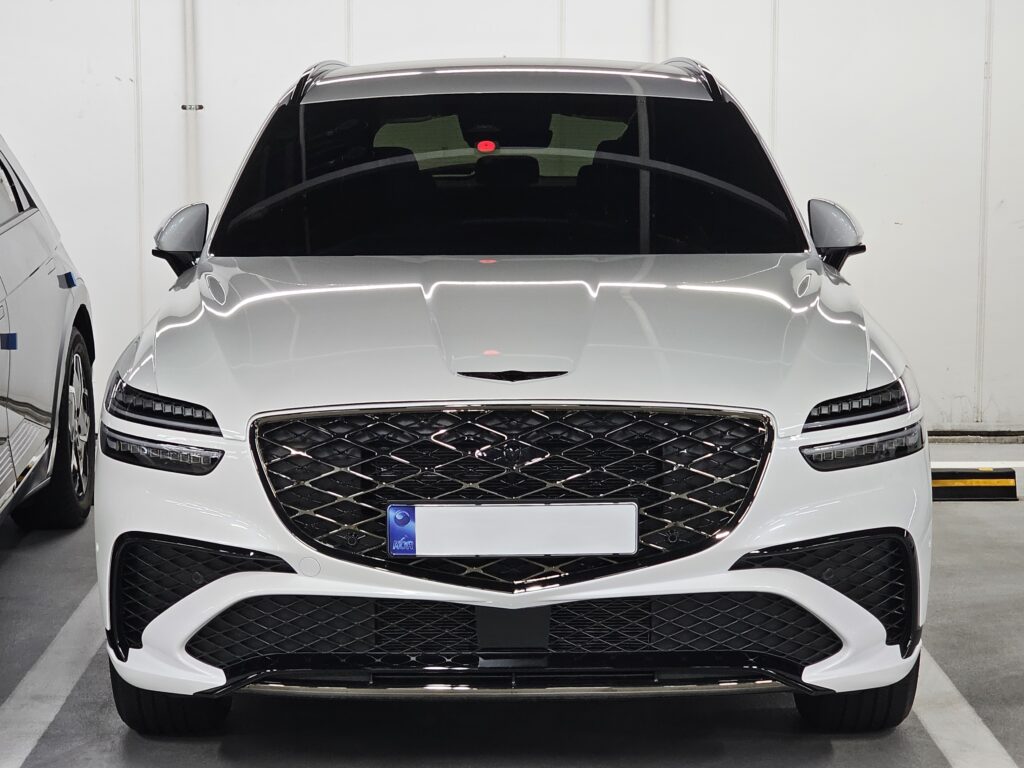
14. **Specific Drawbacks and Differentiators**
No vehicle, regardless of its luxury pedigree or advanced engineering, is entirely without its drawbacks. Understanding these specific limitations, alongside the unique strengths, is crucial for discerning buyers in determining which SUV best aligns with their priorities. The 2025 Genesis Electrified GV70 and the 2025 BMW X1 each present distinct sets of compromises and compelling differentiators.
For the Genesis GV70, its primary challenges revolve around its electric nature and aesthetic choices. The “modest driving range” of 236 miles, while adequate for many, can be a point of consideration for drivers frequently undertaking long-distance journeys or those with limited access to charging infrastructure. Furthermore, its restricted color palette, noted as “only colors are black, gray and white,” limits personalization options, which can be a significant factor for luxury buyers seeking to express individuality through their vehicle’s exterior.
The BMW X1, while a highly competent and appealing luxury subcompact SUV, is not without its own criticisms. Its “complex infotainment system” has been cited as a potential drawback, suggesting that while feature-rich, the user interface might be less intuitive or require a steeper learning curve compared to some rivals. Another significant point of differentiation and a listed con is that “some features found standard on cheaper SUVs cost extra here.” This reinforces the observation that many desirable amenities are optional, pushing up the final price and potentially diminishing its value proposition when compared to a more comprehensively equipped standard vehicle like the GV70. Additionally, the context mentions the M35i variant’s “turbo lag,” a characteristic that, while not specifically for the xDrive28i, indicates a potential performance nuance within the broader X1 family.
Ultimately, these specific drawbacks and unique characteristics define their competitive positions. The GV70 emerges as a bold, value-driven electric luxury SUV offering cutting-edge technology, abundant standard features, and impressive safety, albeit with range and limited customization considerations. The X1, conversely, maintains BMW’s legacy of “Good power and great handling” with “exceptional fuel economy” for a gasoline model and a “high-quality interior,” but its pricing structure and infotainment complexity may require a more considered approach. The choice hinges on whether a buyer prioritizes the innovative electric luxury package of Genesis or the established, sporty competence of BMW, alongside their respective trade-offs.
The 2025 Genesis Electrified GV70 presents a formidable challenge to the established luxury compact SUV segment, particularly against rivals like the BMW X1. Through a comprehensive evaluation of its market position, performance, design, interior luxury, technology, and both active and passive safety, the GV70 consistently demonstrates its intent to redefine value and expectation in the premium space. With its robust electric powertrain, lavish standard features, and advanced safety innovations, it carves out a distinct identity that compels buyers to look beyond brand loyalty. While the X1 holds its ground with proven driving dynamics and traditional gasoline efficiency, the GV70’s commitment to delivering an abundance of luxury and technology as standard, coupled with its advanced protective measures, makes a powerful case. It’s not just a competitor; for many discerning buyers seeking a forward-thinking, feature-rich, and undeniably opulent experience, the Genesis GV70 has become a true leader, offering a compelling vision of modern luxury that genuinely challenges the status quo.



